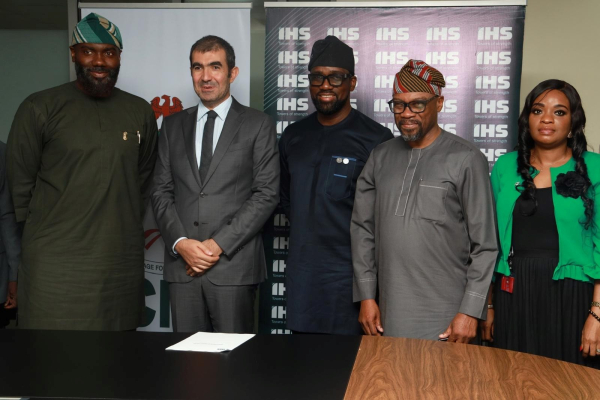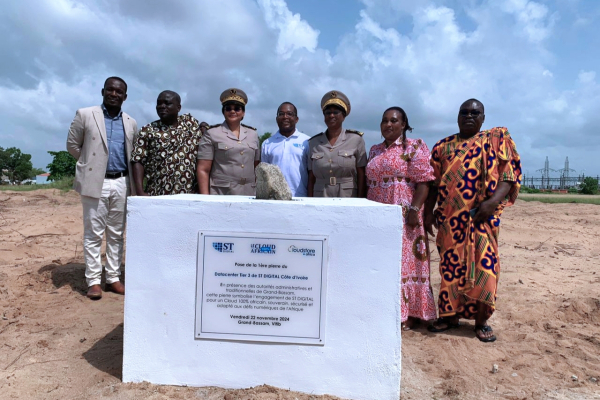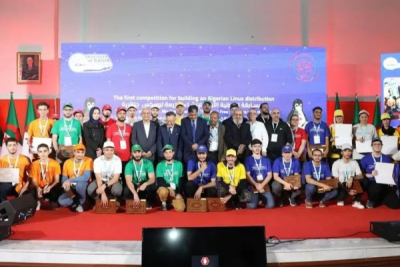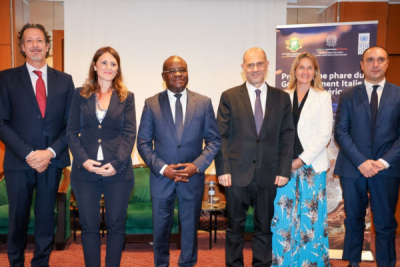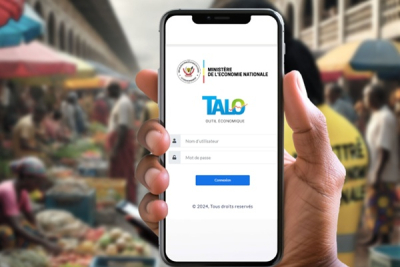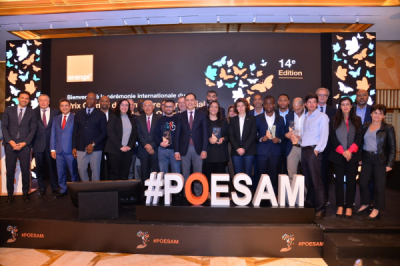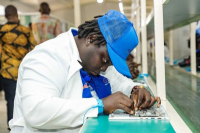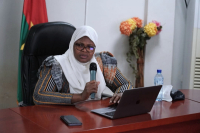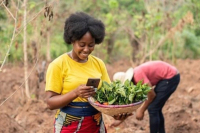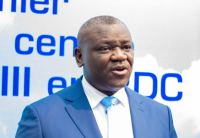
Tech (1113)
Africa's cultural heritage, encompassing ancient artifacts, oral traditions, music, and manuscripts, forms the backbone of its identity. With thousands of artifacts at risk due to environmental degradation, conflict, and illegal looting, digitization safeguards against loss.
Telecommunications tower company IHS Nigeria announced, on November 21, a partnership with the National Commission for Museums and Monuments (NCMM) and the Federal Ministry of Art, Culture, and the Creative Economy (FMACCE) to digitize Nigeria’s cultural heritage. This collaboration seeks to preserve and showcase the nation’s historical artifacts and cultural monuments through a cutting-edge digital museum platform.
Speaking on the initiative, Mohamad Darwish, CEO of IHS Nigeria, emphasized the company’s dedication to cultural preservation and community development. “As a company deeply rooted in Nigeria, we recognize the importance of preserving, protecting, and promoting our cultural heritage,” he said.
The digital museum, the first major project under Nigeria’s Digital Culture Initiative, aims to provide greater public access to the country’s rich cultural heritage. Leveraging advanced technology, the initiative will ensure that Nigeria’s historical and artistic treasures are preserved and made accessible to a global audience.
The initiative aligns with President Bola Ahmed Tinubu's Renewed Hope program, which aims to promote Nigeria's rich cultural heritage, diverse tourism landscape, and creative potential to catalyze economic growth in these key sectors. The program aims to strengthen communities, create sustainable jobs, and reinforce Nigeria's position on the world stage.
According to Olugbile Holloway, Director General of the National Commission on Museums and Monuments, “We believe that to keep ahead of current trends and attract a younger demographic, it is imperative to create and make available to the public a digital experience of our rich cultural heritage. The digital museum will be an invaluable resource for researchers, students, and the general public, both in Nigeria and worldwide, and will play a crucial role in the preservation of our national heritage.”
Hikmatu Bilali
The digital revolution is profoundly reshaping African economies, with technological infrastructure at the heart of this transformation. In this context, data centers are emerging as critical drivers, ensuring access to efficient and sovereign digital services.
Cameroonian cloud service provider ST DIGITAL launched the construction of its Tier 3 data center on Friday, November 22, at the VITIB technology park in Grand-Bassam, Côte d’Ivoire. This strategic project aims to bolster the country's digital sovereignty and meet the growing demand for advanced digital services.
"Our data center, spanning 4,000 square meters, will be a high-security, state-of-the-art, eco-friendly infrastructure with a reduced carbon footprint. We’ve even planned innovative initiatives such as creating artificial lakes and vegetable gardens using outputs from the air-conditioning systems," said Steve Tchouaga, CEO of ST DIGITAL.
This initiative comes as digital transformation accelerates across Africa, accompanied by a surge in cloud adoption. According to PwC's Africa Cloud Business Survey 2023, published in February 2024, 50% of African businesses have already integrated cloud technology into their operations, and 61% plan to fully transition by 2026.
Set to be operational by the end of the first quarter of 2025, the new data center will offer cutting-edge services, including modular colocation spaces, a landing station for submarine cables, and infrastructure designed for artificial intelligence. For Côte d’Ivoire, the facility represents a strategic lever to fast-track digital transformation, foster the local economy, and position Grand-Bassam as a leading tech hub in West Africa, driving innovation and attracting new investments.
Samira Njoya
In an increasingly digital world, countries are striving to bolster their technological capabilities. Local solutions, particularly free and open-source software, play a crucial role in this dynamic.
On Tuesday, November 19, Algerian Minister of Higher Education and Scientific Research Kamel Baddari presided over the official launch of Algeria's operating system at the Dr. Moulay Tahar University in Saïda. The Linux-based system marks a milestone in the country’s digital modernization efforts and the enhancement of its technological capabilities.
“This fully Algerian system is the outcome of collaborative work between students and software researchers from multiple universities. This Linux distribution, blending user-friendliness with robust security, will enhance computer performance and safeguard our information systems. It also lays the groundwork for an open technology economy by providing a strong foundation for the development of numerous software startups,” Baddari said during the ceremony.
The initiative is part of a broader national strategy to modernize Algeria’s universities and position them as hubs for technological innovation. Spearheaded by Dr. Moulay Tahar University, the project involved a nationwide competition, with 10 university teams tasked with designing the operating system. This effort mirrors other recent technological advances in Algeria, such as the launch of the country’s first electric car in April 2023, developed by the Industrial Technology Research Center (CRTI).
The launch coincides with robust global growth in the open-source software market. According to a 2024 report by research firm GitNux, the global open-source market, valued at $21.7 billion in 2021, is projected to reach $66.84 billion by 2026. Additionally, open-source software adoption reportedly saves companies around $60 billion annually worldwide.
These figures underscore the significance of Algeria’s project, which could strengthen the country’s position in the global open-source market while fostering local innovation. The Algerian operating system, designed to meet the demands for cybersecurity and efficiency, could play a pivotal role in the country’s digital transformation while showcasing the talents of its young researchers and entrepreneurs.
Samira Njoya
Digital transformation has become a crucial driver of economic and social development worldwide. Governments and their partners are stepping up initiatives to harness digital potential and bridge technological divides.
On Monday, November 18, the Ivorian government launched the Digital Readiness Assessment (DRA) and the Digital Flagship for West Africa project. Spearheaded by the Ministry of Digital Transformation and Digitalization, in partnership with the United Nations Development Programme (UNDP) and the Italian embassy, these initiatives aim to strengthen the digital ecosystem and advance Côte d'Ivoire toward a connected, inclusive society.
“Although it’s just one step, we’re realizing a vision a Côte d'Ivoire firmly committed to digital transformation as championed by President Alassane Ouattara,” stated Ibrahim Kalil Konaté, Minister of Digital Transformation and Digitalization.
The Digital Readiness Assessment, developed by UNDP, serves as a strategic tool to set data-driven digital priorities. It also identifies technological opportunities that could accelerate sustainable development goals and enhance the country's digital preparedness.
Funded by the Italian government, the Digital Flagship for West Africa project focuses on improving connectivity in rural and remote areas, strengthening digital infrastructure, and creating efficient public digital systems.
Both projects align with the National Digital Development Strategy for 2025, which aims to connect the entire country, develop digital skills among civil servants and young people, and support digital entrepreneurship. Côte d'Ivoire has already made significant strides, with more than 30,240 km of fiber optic cable installed, covering 94.86% of the country’s localities as of March 31, 2024, according to the telecom regulator.
These new initiatives are expected to provide a detailed assessment of existing infrastructure, pinpoint gaps, and outline strategic priorities for balanced sector development. They also aim to reduce the digital divide by bringing quality Internet access to underserved areas, thereby promoting digital inclusion and territorial equity.
Samira Njoya
Insufficient information about market supply can fuel inflation. Sometimes, unscrupulous merchants exploit shortages to artificially inflate prices. Preventing such practices is crucial for economic and social equity.
The Democratic Republic of Congo (DRC) has unveiled a new mobile app, TALO, developed by local talent to improve economic oversight. Presented to the Council of Ministers, last Friday, by Deputy Prime Minister Daniel Mukoko Samba, the app aims to improve transparency and price regulation through real-time monitoring of commercial practices and stock flows.
TALO comprises two modules: a mobile module for field investigators to collect and centralize price data weekly, and a platform for businesses to directly submit information on inventory, pricing, and pricing structures. The system aims to enhance transparency in commercial practices and strengthen economic regulation.
Its adoption demonstrates the Congolese government’s commitment to enhancing transparency and restoring trust in economic oversight for both businesses and the public. According to Mukoko Samba, the initiative seeks to turn oversight functions into genuine regulatory tools, free from abuses, to ensure a fairer and more reliable business environment.
TALO aligns with broader efforts to improve economic regulation in the DRC. By enabling more transparent and effective management of economic controls, the app supports adherence to standards, strengthens control missions, and safeguards due process for businesses. It also facilitates complaint collection and the detection of potential irregularities.
With this system, the government aims to create a more equitable economic framework that fosters transparency and strengthens the trust of economic actors. Raising operator awareness, through the distribution of a guide on economic oversight, is also essential to securing a more regulated and investment-friendly business environment in the DRC.
African and Middle Eastern entrepreneurs with innovative projects are being celebrated for solutions that blend social impact with digital transformation. By showcasing these startups, the Orange Social Entrepreneur Prize highlights ingenuity aimed at addressing regional challenges.
The top international winners of the Orange Social Venture Prize in Africa and the Middle East (OSVP/POESAM) have been announced. Moroccan startup SAVEY, Tunisia’s WeFix, and Côte d'Ivoire's Cocoa Shield were officially presented to the public on Tuesday, November 12, during an international ceremony held in Casablanca, Morocco.
According to an Orange press release, these winners were selected from a pool of 1,600 applicants from 17 countries. The awarded projects in this 14th edition of OSVP cover diverse fields, including education, health, e-commerce, agriculture, and environmental protection.
The Grand Prize was awarded to Moroccan startup SAVEY, which offers a digital and logistical solution to reduce food waste by selling unsold or near-expiry food items. This solution earned them €25,000 in funding.
The second prize went to Tunisian startup WeFix, which provides a digital solution to support individuals and companies in the sustainable management of electronic and household appliances. This start-up received €15,000 in funding.
In third place was Ivorian startup Cocoa Shield, which uses AI and IoT to monitor and track cocoa crops, helping to combat crop diseases. This start-up was awarded €10,000.
The International Women’s Prize, celebrating a female-led startup with significant impact, was awarded to MyTindy (Morocco), an online platform connecting artisans with international customers to facilitate direct and independent sales. This platform received €20,000 in funding.
Finally, the "Coup de Cœur" prize went to Intella, an Egyptian start-up developing a multi-dialect Arabic speech-to-text transcription engine, one of the most accurate in the world, aimed at bridging the gap between AI advancements and the Arab-speaking world.
In addition to these awards, the national winners of POESAM 2024 from Orange’s 17 markets in the Middle East and Africa will receive support from Orange Digital Centers. This support will help them expand their businesses beyond national borders through a network active in Africa, the Middle East, and Europe.
Samira Njoya
In today's digital age, access to technology is crucial for development. Initiatives that empower people with digital skills and tools are essential for creating a more inclusive and prosperous future.
On Sunday, November 10, Guinea’s Prime Minister Amadou Oury Bah inaugurated the country’s first laptop assembly unit in Mamou, located within the Higher Institute of Technology (IST). This project, launched in collaboration with the Ministry of Higher Education, Chinese company Green View, and local partner Guinea Technologie Innovation (GTI), marks a significant step toward positioning Guinea as a technological leader in West Africa.
"Guinea needs to be a player in technology. We must not only consume phones and laptops but also manufacture them. We have resources, a vision, and the responsibility to train the talent to bring this vision to life," said Prime Minister Bah.
The initiative is part of the “Simandou 2040” vision led by the transitional president, Mamadi Doumbouya, which aims to modernize and diversify Guinea’s economy. As part of this strategy, the government intends to transform Mamou into a regional tech hub, called “Mamou Valley,” where academic institutions and businesses will collaborate to drive innovation. Additional initiatives are underway, including the construction of regional universities, the establishment of a Science and Innovation City, and the redesign of technology training programs.
With 4.87 million internet users as of January 2024, according to DataReportal, and an internet penetration rate estimated by the government at 52% in May, Guinea has potential for further digital inclusion. However, the high cost of computers and smartphones remains a barrier. This laptop assembly project is expected to help lower these costs, making technology more accessible, while also boosting the digital job market and supporting national economic transformation.
Samira Njoya
With rapidly evolving communication and delivery methods, modernizing postal services in Africa has become a necessity. Postal services must adapt to meet the changing needs of society, integrating digital solutions to stay relevant and effective in a fast-paced environment.
Burkina Faso introduced, on Tuesday, November 5th, new digita solutions aimed at enhancing postal and financial services. Presented by Minister of Digital Transition, Posts, and Electronic Communications, Aminata Zerbo/Sabane (photo), they include Poste Money, a mobile app that enables users to send and receive money, make merchant payments, and manage accounts. Poste Money includes a semi-offline feature to support areas with limited connectivity.
The government also presented Cashless PDI, an application designed to ensure the secure and transparent distribution of aid funds directly to internally displaced persons (IDPs).
To improve core postal services, La Poste has introduced DBOX (Delivery Box), an automated mail distribution system that addresses the rising demand for fast, secure postal services. Additionally, self-service deposit machines will be installed, allowing customers to deposit funds independently.
Future projects include the launch of a Postal Electronic Messaging Box (BMEP) for professional and personal digital exchanges, and Poste Mobile, which aims to extend financial services to rural and remote areas.
These initiatives align with Burkina Faso’s national digitalization plan and the Universal Postal Union (UPU) guidelines, as the country seeks to modernize its postal services. The UPU’s 2023 Integrated Index for Postal Development (2IPD) currently rates Burkina Faso’s postal development at only two out of ten, underscoring the need for urgent modernization.
Samira Njoya
Digital technologies can revolutionize African agriculture. The adoption of innovative technologies can boost productivity and enhance the competitiveness of farmers across the continent.
Access to technology, combined with tools such as big data, GPS, and drones, could increase crop yields in Africa by 10.5% to 20% over the next five years, the GSM Association (GSMA) projects. In its May 2024 report, Driving Digital Transformation of African Economies, the organization also predicts that expanding ICT usage in African agriculture could lead to a 23% increase in profits over the same period. GSMA emphasizes the need for African governments to make smart digital investments, as these could drive growth across several strategic economic sectors.
Agriculture remains a critical engine for growth and employment in Africa. Recent advancements are already delivering more efficient services to farmers. “For example, Aerobotics in South Africa provides data analytics and machine learning to process aerial imagery from drones and satellites, providing realtime insights on crop performance, pests, plant health, irrigation levels,” the report details.
Even simpler digital tools can enhance agricultural supply chain efficiency through better access to information and training. “SMS messages to smallholder sugarcane farmers about when to perform specific agricultural tasks was found to increase yields by 11.5%,” GSMA notes.
Additionally, technology is enhancing market access for farmers through new models of aggregation, logistics, and supply chain management. In Ethiopia, for instance, the Ethiopian Commodity Exchange now differentiates coffee quality more effectively, and its traceability technology allows small farmers to connect directly with global buyers.
Agriculture is essential to Africa’s economic growth and food security, and international organizations, including the United Nations, are calling for its digital transformation to improve product quality and yields. This interest has spurred continuous investment in agritech startups over the past five years, despite the 2023 funding crunch. According to Briter Bridges’ State of AgTech Investment in Africa 2024 report, the agricultural sector accounted for 13% of total funding and 5% of all fundraising deals in 2020. While this dropped to 6% of both funding and deal volume in 2023, Oxford Business Group’s Agriculture in Africa 2023, in partnership with OCP Group, forecasts a promising annual growth rate of 44% in African agritech from 2023 to 2028.
For African farmers to fully benefit from digital transformation, however, expanding network coverage, increasing access to mobile devices, and making internet access affordable are crucial. Addressing these issues could integrate more farmers into the digital economy. According to GSMA’s The State of Mobile Internet Connectivity 2024 report, boosting mobile internet use could add $795 billion to Africa’s GDP between 2023 and 2030.
Samira Njoya
Digital cooperation is crucial for driving technological advancement and economic growth. It allows countries to work together to address digital challenges and spur innovation.
The Democratic Republic of Congo’s (DRC) Minister of Posts, Telecommunications, and Digital Affairs, Augustin Kibassa Maliba, is currently on an official visit to Warsaw, Poland, to strengthen digital cooperation between the two countries. This visit, which began on Thursday, November 7, seeks to finalize agreements on key projects aimed at advancing the DRC’s digital development.
According to a statement from the DRC’s ICT Ministry, the agreements will promote cooperation across key digital segments, including infrastructure modernization through the development of high-speed networks and data centers to improve connectivity. Cybersecurity is also a focal area, with initiatives designed to enhance defenses against cyberattacks.
Another priority is supporting e-government by digitizing public services to improve their efficiency and accessibility for citizens. Additionally, the agreements include plans to establish ICT training centers, aimed at developing young talent in the digital sector and stimulating innovation, especially by supporting tech startups.
This initiative is part of the “Horizon 2025” National Digital Plan, launched to drive the DRC’s digital transformation goals. It follows a recent meeting between Congolese President Félix Tshisekedi and Polish President Andrzej Duda on the sidelines of the 79th session of the United Nations General Assembly in New York in September. The two leaders announced plans for future partnerships in digital transformation and defense.
As part of this collaboration, Poland will contribute its expertise, particularly in connectivity infrastructure. With an ultra-high-capacity network covering 81.1% of households, Poland is a leader in fiber optic technology—a model the DRC aims to emulate to reach its own connectivity targets by 2050. Leveraging Polish expertise, the DRC aims to achieve over 50% fiber optic coverage and connect more than 90% of its population to the mobile network by 2050, facilitating comprehensive digital transformation and inclusive economic growth.
Samira Njoya
More...
Digital technologies offer an innovative approach to preserving cultural heritage and traditions. Across Africa, countries are harnessing these tools to increase the visibility of their heritage and drive economic growth.
The integration of digital technologies in the preservation and promotion of intangible heritage presents significant opportunities for Senegal, according to Senegalese President Bassirou Diomaye Faye. During the opening ceremony of the 15th Dakar Biennale of Contemporary African Art on Thursday, November 7, he urged cultural stakeholders to utilize digital tools to enrich and disseminate the country’s cultural heritage globally.
"Digital technologies have transformed the cultural value chain, making the cultural economy increasingly digital. Digitalization offers an opportunity to enhance our rich intangible heritage. The national cultural sector must seize and harness the considerable potential offered by digitalization," President Faye stated.
This call to action aligns with the mission of the Biennale—a prominent event that, beyond its artistic focus, aims to place culture at the center of contemporary issues. It also reflects the recommendations from UNESCO's 2018 report, Re-thinking Cultural Policies: Placing Creativity at the Heart of Development, which underscores the transformation of the cultural value chain and highlights the central role of digital technology in the evolving cultural economy.
The implications of this vision for Senegal are substantial. By fully embracing digital technologies, the country could not only preserve and promote its intangible cultural heritage but also enhance its creative economy, generating new job opportunities for youth and women. Digital transformation will facilitate better management of cultural data, archiving, and access to works, paving the way for a redefined role for Senegal on the global cultural stage.
Samira Njoya
As more Africans connect online, concerns about the inadequate protection of personal information are fueling a growing focus on data privacy and regulatory control in digital communications. This shift reflects broader global efforts to strengthen data protection in online spaces.
Zimbabwe’s Minister of ICT, Postal, and Courier Services, Tatenda Mavetera, announced new regulations mandating that all WhatsApp group administrators register and obtain a license from the Post and Telecommunications Regulatory Authority of Zimbabwe (POTRAZ). The announcement was made at the POTRAZ breakfast meeting on Wednesday, November 6.
This licensing, which starts at a minimum fee of $50, will apply to various groups, including businesses, community organizations, and churches. Non-compliance could result in penalties, and POTRAZ advises groups to seek guidance on fulfilling the new obligations.
Minister Mavetera emphasized the new requirements as essential for enhancing data privacy and security, impacting any group that collects personal information. "Even churches who collect personal data ought to have such a license and appoint a Data Protection Officer (DPO)," she explained, underlining the government’s intent to strengthen data security for all citizens.
Zimbabwe enacted the Data Protection Act in 2021 to safeguard personal data and regulate its handling across all digital platforms. With WhatsApp groups commonly used for communication, government entities argue that requiring licenses for group admins and Data Protection Officers aligns with the Act’s mandate to protect personal information from potential misuse.
The Postal & Telecommunications Sector Abridged Performance Report for Q2 2024 reveals that mobile internet and data traffic in Zimbabwe increased by 12.5%, climbing from 58.44 petabytes in Q1 2024 to 65.75 petabytes in Q2. This rise likely reflects consumers' growing reliance on mobile data for internet access, with social media being a major contributor to this consumption.
Alongside the license, group admins must appoint a certified DPO, a role mandated by Zimbabwe’s Data Protection Act. The Act defines personal data as any information that can identify a person, and the government asserts that group admins, having access to members' phone numbers, need to protect such data accordingly.
Hikmatu Bilali
Africa’s digital landscape is poised for continued expansion, with a focus on improving digital access across both urban and rural regions. Maintaining favorable regulations and addressing infrastructure constraints will be essential to sustaining this momentum.
Starlink has paused new subscriptions in Nairobi and five nearby counties due to overwhelming demand that has stretched the network's capacity. On November 4, CEO Elon Musk addressed the issue, stating that Starlink is actively working to expand internet capacity in densely populated urban areas.
Starlink is working to increase Internet capacity in dense urban areas in Africa as fast as possible.
— Elon Musk (@elonmusk) November 4, 2024
Please note that there is still significant capacity outside of city centers. https://t.co/Vlk4sNDAjX
The communications Authority of Kenya reveals in its Fourth Quarter Sector Statistics Report For The Financial Year 2023/2024 that Satellite subscriptions recorded a significant growth, from 405 in June 2023 to 8,324 in June 2024, an annual growth rate of 1,955.3%. This growth is attributed to the licensing and subsequent launch of Starlink Internet Services Kenya earlier in the financial year, laying the foundation for digital services to reach even remote regions.
Starlink provides high-speed, low-latency broadband using Low Earth Orbit (LEO) satellites, offering speeds of up to 200 Mbps. Initially, Starlink offered a 100 Mbps plan at KES 6,500 ($50), while leading telco Safaricom provided the same speed in its Diamond plan at KES 12,499 ($97). However, in response to competition, Safaricom upgraded its Diamond package in September 2024, maintaining the same price but increasing the speed to 500 Mbps.
Since its launch in Kenya in July 2023, Starlink has risen to capture 0.5% of the market share with 8,063 subscribers, according to the Communications Authority. This growth was fueled by discounted kits and affordable monthly plans. To attract budget-conscious customers, Starlink introduced a KES 1,950 ($15) monthly rental plan for its hardware in August this year, which otherwise costs KES 45,000 ($349) to purchase.
This situation serves as a valuable case for broader discussions on internet infrastructure in Africa, where underserved regions often struggle with high costs and inconsistent service from traditional ISPs. Starlink's entry into the market has been a disruptive force, offering an alternative with competitive pricing and reaching areas previously underserved by terrestrial networks.
Hikmatu Bilali
Since the beginning of the year, investment vehicles have been forming across the continent to fund the startup ecosystem. Several companies have joined forces to launch a new initiative in this direction.
Mara Group, a conglomerate founded by British entrepreneur Ashish Thakkar, has announced the creation of a $250 million investment vehicle to support African startups. The agreement was signed on the sidelines of the 2024 Future Investment Initiative, held last week in Riyadh, Saudi Arabia.
Mara Group has partnered with Startupbootcamp, a technology accelerator, and India-based investment firm Blend Financial Services to execute this project. The new fund will target growth-stage startups and pre-IPO financing, with a focus on South Africa, Nigeria, Kenya, Côte d'Ivoire, and Egypt.
Besides Côte d'Ivoire, the other four target countries represent Africa’s most attractive startup ecosystems in terms of funding. According to Partech Africa data, startups in the "Big Four"—South Africa, Nigeria, Kenya, and Egypt—drew nearly 79% of the continent’s total venture capital funding in 2023, amounting to $1.79 billion. In 2022, these countries captured 72% of funding, totaling $3.5 billion. Startups in Côte d'Ivoire raised $33 million in 2022 and $21 million in 2023, making it the only Francophone country included in the initiative.
This move comes amid a tightening of capital in Africa’s tech ecosystem since 2023, a year marked by a sharp decline in startup fundraising. According to Africa: The Big Deal, African startups have raised $1.7 billion so far this year, a 32% drop from the same period in 2023.
Adoni Conrad Quenum


